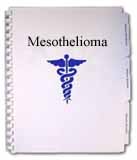|
Mesothelioma and Lung Cancer News - Return to Menu
Bionic Nose Sniffs Out Lung Cancer
By Tom Ewing, MedPage Today Staff Writer
Reviewed by Zalman S. Agus, MD; Emeritus Professor at the University of Pennsylvania School of Medicine.
CLEVELAND, April 7-A bionic nose that analyzes the organic compounds in exhaled breath may some day be used to detect lung cancer when it's still early, according to Cleveland Clinic researchers.
The small, handheld device employs sensor technology that determines the biochemical constituents of breath that appear to be unique to lung cancer.
Called Cyranose, the device can pick up the scent of volatile organic compounds contained in human breath, including such compounds as penzane, isoprene acetone, and benzene. These are known to occur in uniquely altered patterns in the breath of lung cancer patients.
In a recent study involving people with and without lung cancer, the so-called electronic nose was almost 92% accurate in sensing those altered patterns, correctly identifying those subjects with the disease.
Serpil Erzurum, M.D., a pathologist who is a member of the research team predicted that Cyranose "can be used as a noninvasive tool for the early diagnosis of lung cancer and to monitor the effectiveness of treatment on lung cancer patients."
Its use, said Dr. Erzurum, could enable physicians to determine the appropriate course of a lung cancer patient's treatment before the cancer has metastasized.
Moreover, she noted the small, portable nature of the device, which costs about $8,000, makes it easy to use in physicians' offices and outpatient settings. Cyranose, which resembles a walkie-talkie, has previously been used in commercial applications, such as the analysis of volatile organic compounds in the food industry.
The device contains an array of chemical vapor sensors consisting of carbon-black/polymer composites. A patient's exhaled breath passes over these sensors, which then expand like a sponge, changing the resistance of the composites. The change in resistance produces unique patterns that are displayed in maps of dot patterns on a computer screen, with each type of bacteria moving through the device having a distinctive pattern.
In the Cleveland Clinic study, slated for publication soon in the American Journal of Respiratory and Critical Care Medicine, researchers analyzed the exhaled breath of 14 individuals with bronchogenic carcinoma and 45 healthy, noncancer controls. Principal component and canonical discriminant analysis demonstrated discrimination between samples from patients with lung cancer and those from the healthy subjects.
The researchers found that the electronic nose had 71.4% sensitivity and 91.9% specificity for detecting lung cancer. "These are pretty good numbers for such a noninvasive test," according to Peter Mazzone, MD, director of the Cleveland Clinic's lung cancer program.
Regarding the telltale characteristics of a cancer patient's breath, he speculated that "cancer cells have slightly different metabolic activity than normal cells, so they break down substances that we breathe or eat in a slightly different way. And it's those differences in metabolism that show up in the chemicals in the breath."
While the electronic nose is capable of detecting the presence or absence of lung cancer, it has not been able to determine the size or stage of a tumor, said Dr. Mazzone.
Clinical use of the device, he said, depends on future studies. "Our study involved a small number of people, and the results are promising enough to justify studies with much larger groups of patients," he noted.
It's conceivable, he added, that electronic nose technology could be considered a good clinical tool "two or three years from now."
Primary source: American Journal of Respiratory Medicine and Critical Care Management
Source reference:
Machado R, et al. Detection of Lung Cancer by Sensor Array Analyses of Exhaled Breath. Am J Respir Crit Care Med. 2005
MedPage Today Action Points
Explain to patients who ask that the use of electronic nose technology as a clinical tool for diagnosing lung cancer is interesting but preliminary and unlikely to occur in the near future. Further work needs to be done in a larger, more diverse population which includes patients with less advanced disease and those with suspected lung neoplasms. In addition, further study is needed to understand optimal strategies for using the electronic nose in population-based screening.
Keep abreast of large-scale studies that will assess the value of electronic nose technology as a reliable diagnostic device.
|

































